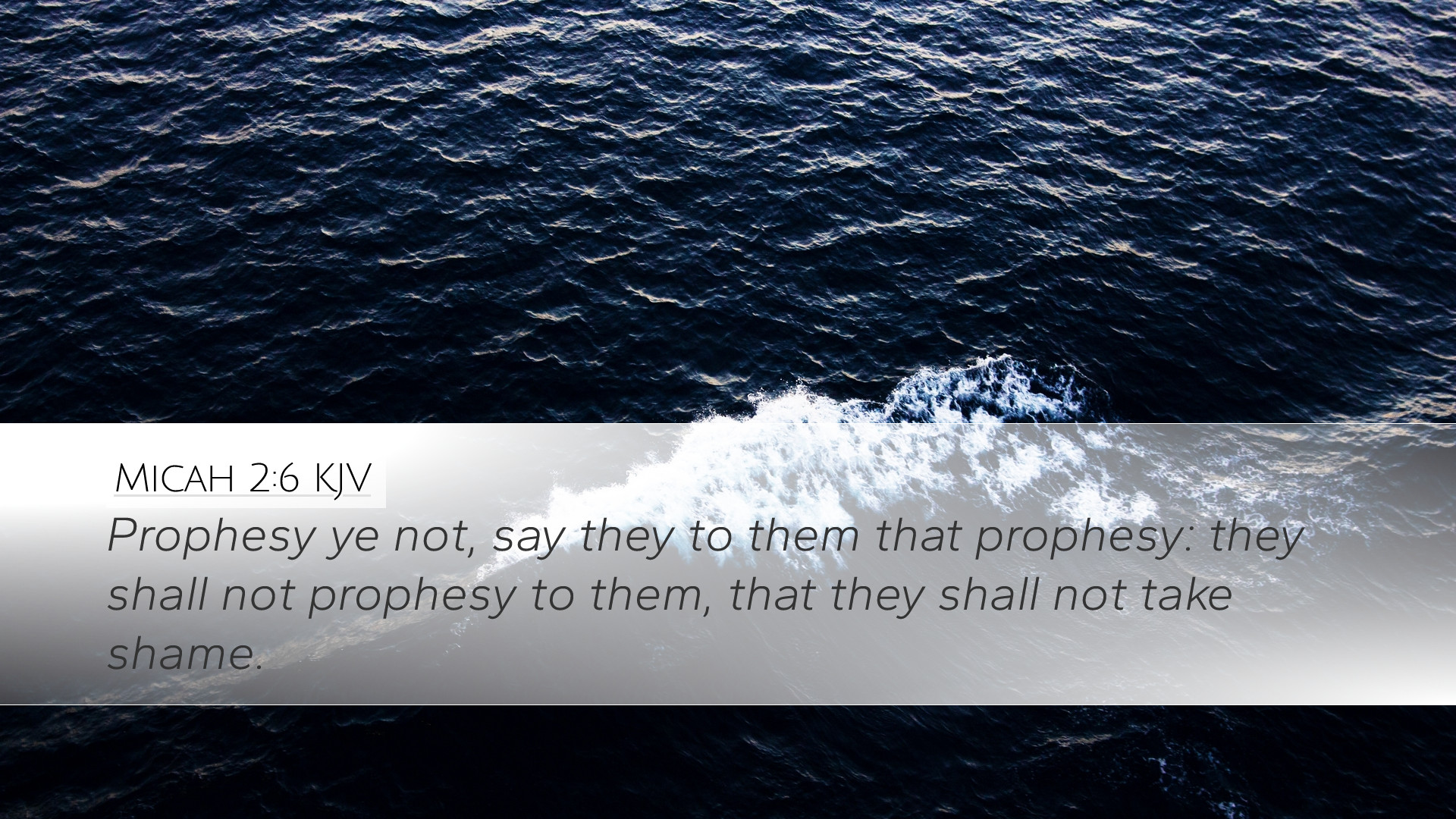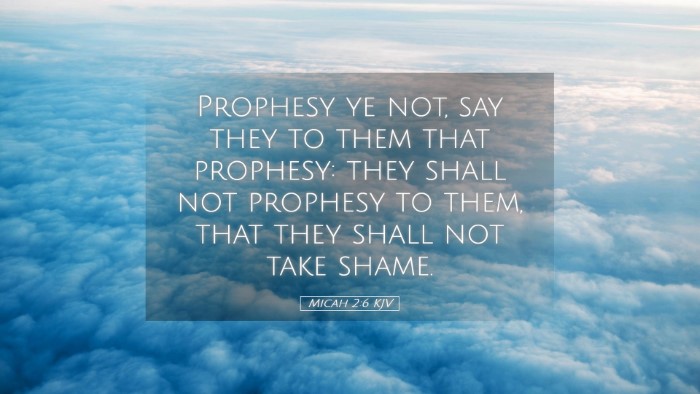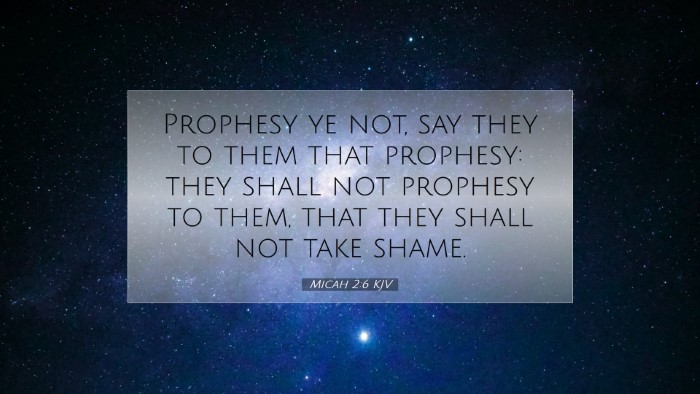Old Testament
Genesis Exodus Leviticus Numbers Deuteronomy Joshua Judges Ruth 1 Samuel 2 Samuel 1 Kings 2 Kings 1 Chronicles 2 Chronicles Ezra Nehemiah Esther Job Psalms Proverbs Ecclesiastes Song of Solomon Isaiah Jeremiah Lamentations Ezekiel Daniel Hosea Joel Amos Obadiah Jonah Micah Nahum Habakkuk Zephaniah Haggai Zechariah MalachiMicah 2:6
Micah 2:6 KJV
Prophesy ye not, say they to them that prophesy: they shall not prophesy to them, that they shall not take shame.
Micah 2:6 Bible Commentary
Commentary on Micah 2:6
Verse Text: "Do not prattle. Thus they say to those who prophesy, So shall you not prophesy to them; they shall not take shame." (Micah 2:6)
Introduction
The book of Micah is a significant prophetic text that speaks against the injustices prevalent in Israel during the 8th century BCE. The prophet Micah, whose name means "Who is like Yahweh?", is noted for his assertions of divine judgment against both Israel and Judah due to their disregard for true worship and social equity. In this verse, Micah highlights the conflict between true prophecy and the reluctance of the people to hear the uncomfortable truths of God's message.
Reflections on the Text
This verse encapsulates a broader theme within Micah's prophecies: the resistance of the people to accept prophetic messages that challenge their current way of life. Public domain commentaries, such as those by Matthew Henry, Albert Barnes, and Adam Clarke, provide rich insights into the implications of this scripture.
The Nature of Resistance
Matthew Henry emphasizes the human tendency to resist divine correction. He notes that the people preferred smooth speaking rather than hard truths, as they sought to avoid any feelings of shame or guilt associated with their sins. This pattern of behavior is prevalent in many contexts today, where individuals and communities often seek to silence messages that convict them.
- Comfort vs. Challenge: Many are uncomfortable with calls for repentance, preferring messages that affirm their current state.
- Silencing Prophets: The phrase "So shall you not prophesy to them" reflects the attempts of the people to control and silence the prophetic voices speaking hard truths.
The Role of the Prophet
Albert Barnes points out that the role of prophets was to convey God's messages, which often included calls for repentance and warnings of impending judgment. The resistance faced by these prophets reflects a deeper issue within the hearts of the people—a desire to avoid accountability and responsibility.
- Accountability: True prophets, as conduits of God's message, call people to recognize their failings and return to righteousness.
- Public Reaction: The public's reaction to prophetic words is often a reflection of their own spiritual condition.
The Consequences of Rejecting Prophecy
Adam Clarke explicates the notion that rejecting prophetic words leads to severe spiritual ramifications. When a society chooses to ignore the calls for repentance, they not only do themselves harm but also invite divine judgment. Clarke notes that this verse underscores the potential consequences for the people of Israel if they continue to disregard the messages sent to them.
- Spiritual Blindness: A continued refusal to listen to God's messengers leads to a hardened heart and a lack of spiritual insight.
- Divine Judgment: Ignores the severe warnings and may lead to national or communal decline.
Theological Implications
Within the context of Micah 2:6, we observe profound theological implications regarding the relationship between God, His messengers, and His people. The verse raises timeless questions about authority, accountability, and the nature of divine communication.
Authority of Scripture
The authority of prophetic scripture is paramount in guiding moral and ethical conduct. The texts remind readers that God’s word is not merely advisory but foundational and essential for a life aligned with His will.
Call for Discernment
For theologians and students of the Word, there lies an important lesson in discerning true prophecy from falsehood. The message of Micah is a reminder to critically engage with teachings and to evaluate them against the backdrop of Scripture, ensuring alignment with God's character.
Application for Today
The message encapsulated in Micah 2:6 speaks volumes to contemporary faith communities. As society continues to grapple with issues of morality, justice, and accountability, believers are urged to remain receptive to prophetic voices, whether they come from Scripture or from those who faithfully proclaim its truths today.
- Openness to Rebuke: Encourage a culture within churches that does not shy away from correction but embraces it as a vehicle for growth.
- Support for Prophetic Voices: Foster clergy and lay leaders who are unafraid to speak difficult truths in love, urging communities towards the heart of God.
- Engagement with Scripture: Commit to studying the word of God to better understand His directives and to discern the healing of nations and individuals through aligned living.
Conclusion
Micah 2:6 serves as a poignant reminder of our propensity to reject the hard messages of God. Through the insights gathered from esteemed commentaries, we see a clear link between the prophetic call to repentance and the responsibility of individuals and communities to heed those calls for spiritual renewal and correction. As pastors, students, theologians, and scholars reflect upon this passage, may they be emboldened to not only accept the truths imparted through Scripture but to also actively promote a culture of openness to divine correction, thereby fostering spiritual growth and communal accountability.


